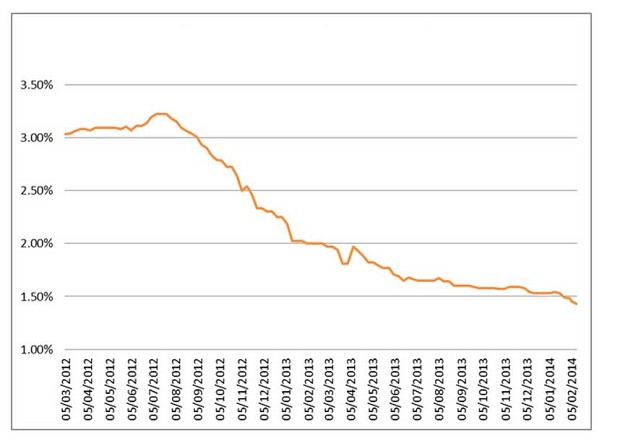Financial institution fee to rise – but much more cuts for savers
Markets are predicting Financial institution Fee rises next year – but banks are continuing to pull the best-purchase accounts. The purpose is easy 
Photograph: SavingsChampion.co.united kingdom
Savers suffered a blow this week when Mark Carney, the Bank of England Governor, signalled on Wednesday that curiosity prices would be unlikely to rise until finally 2015.
His statement efficiently replaced the Bank’s earlier advice, which had linked the possibility of greater rates to strengthening unemployment figures. With the jobless rate coming down more quickly than anticipated, savers had hoped for increased charges sooner. But people hopes had been dashed.
But away from the macroeconomics, savers are dealing with other assaults on costs as banks and creating societies minimize back appealing prices in a continuation of “negative competition” – a phenomenon reported previously by AgenciesIncome.
This is in which banks and constructing societies, already getting loads of deposits on their books, do not want to entice far more. So any accounts which supply eye-catching returns and which are pulling in funds are withdrawn, or reissued paying a decrease charge. This becomes a vicious cycle, causing prices to tumble in a “race to the bottom”. The graph exhibits this effect over the past 12 months – during which time the Financial institution Fee has remained at .5pc.
More than the past two weeks a variety of suppliers have lowered the rates on their marketplace-major cost savings accounts. State Bank of India replaced its straightforward-entry account paying 1.5pc with a new problem having to pay a lower rate of one.25pc, whilst Shawbrook Bank replaced its 180 Day Observe Account Situation 12 having to pay 1.8pc, with Concern 13 paying out 1.5pc.
“Yet again there is no signal of an end to the plight of savers any time soon,” mentioned savings specialist Anna Bowes of fee-monitoring site SavingsChampion.co.united kingdom.
“We are concerned that there is no support, not only for existing savers but also the savers of tomorrow.” With interest prices on financial savings accounts at historically low ranges, and with best-purchase prices on financial savings accounts continuing to fall, there is “a diminishing incentive to save”, Ms Bowes added.
Kent Reliance replaced its effortless-entry account paying 1.6pc, with a a lot lower charge of 1.45pc – nevertheless virtually kept its best-get standing.
The AA lowered the 1.5pc fee on its easy-access account to 1.3pc, whilst Virgin removed its market place-foremost notice account altogether.
Easy-accessibility accounts – exactly where savers can withdraw their money without restriction (however most accounts do hold penalties for as well many withdrawals) – now offer you a lot decrease costs than they did two years ago. Currently, the regular curiosity charge on the leading five very best-buy effortless-accessibility accounts is one.43pc, with the regular fee last 12 months standing at 2pc, and 3pc in 2012.
For savers asking yourself exactly where to place their income, Britannia – portion of the Co-operative Bank – provides the ideal simple-accessibility fee on the industry at one.5pc, but the account calls for a £500 minimal deposit and permits only four withdrawals per yr or the fee drops to .1pc. Kent Reliance provides the following best rate at 1.45pc on minimum deposits of £1,000 and enables comprehensive accessibility to funds – even though a signed form need to be sent to the provider for each and every withdrawal.
To get increased prices, savers will want to lock their income away in fixed-fee bonds. FirstSave is giving a charge of 3.25pc for individuals who are prepared to resolve for 5 years, while the Post Workplace is having to pay 1.8pc to these who correct for just a 12 months.
Isas, which permit taxpayers to conserve up to £5,760 (for the 2013/14 tax yr) tax free, are also a very good option. Earl Shilton Creating Society delivers a very best-get charge of one.8pc on its variable Isa, while Leeds Developing Society pays three.05pc for those who correct for five years. This account does come with the extra bonus of making it possible for savers to withdraw 25pc of the stability without observe or penalty.
What up coming for the Financial institution Rate?
The market’s prediction for when the Bank Price or base fee – at .5pc – will rise is captured in the Financial institution of England’s quarterly inflation report. It is primarily based on the regular forecast more than 3 weeks, running up to February 5. The table displays that prediction.
The marketplace, after Mark Carney’s feedback on Wednesday, shifted its prediction for the 1st rise, from mid-Spring 2015 to the begin of 2015. More rises are expected later on in 2015.
Far more: Our favourite ideal-get money Isas
Savings tricks: How to earn 5pc
